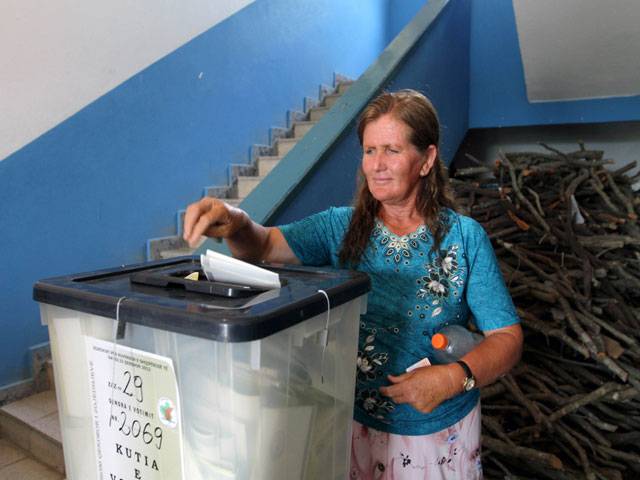TIRANA : Albania’s ruling coalition of outgoing Prime Minister Sali Berisha and its leftist opposition led by Socialist Edi Rama both claimed victory in Sunday’s legislative polls.
Although first official preliminary results were expected only on Monday, both Berisha and Rama said their coalitions had won most votes in the polls. The Central Electoral Commission said it had allowed the vote to be extended after the 1700 GMT closing time as many people were still waiting to cast their ballots.
Earlier, an opposition activist was killed in an apparently politically motivated shooting in Albania.
The victim was a 53-year-old activist with the Socialist-led coalition of former Tirana mayor Edi Rama. At the same time a rival candidate for parliament from the ruling Democratic party of conservative Prime Minister Sali Berisha was wounded along with two others.
A police spokeswoman said the shootout in the northern town of Lac “might be related to the vote,” but did not want to elaborate pending the outcome of the investigation.
Rama - whose coalition has a slight edge in the race according to analysts - branded the shooting a “serious political incident... aimed at intimidating the voters.”
“Berisha should take responsibility... and pay for it,” Rama, 48, told reporters after rushing to Lac.
Both sides have been accusing each other of vote-buying and electoral roll irregularities, raising concerns there could be a repeat of the 2009 polls which triggered months of political turmoil and government paralysis.
Around 6,000 police were on duty on Sunday to try to keep the peace.
Officials said the turnout was 35.77 percent about four hours before the polling stations close at 1700 GMT.
In Tirana, people were queueing to cast their ballots even before polling stations opened.
“In Albania, everyone is so obsessed with politics, they think of it even when they make love,” said 30-year-old engineer Arsen Prifit.
Berisha, seeking his third mandate to lead the Muslim majority nation after eight years in power, has vowed that “the will of the citizens shall be respected”.
Having failed to deliver clean elections since the fall of communism two decades ago, Albania desperately needs to prove that it is able to hold fair polls that meet international standards if it is to have a shot at joining the European bloc.
Since the collapse of Enver Hoxha’s communist regime in 1990, elections in Albania have been marred by violence and allegations of vote-fixing.
Brussels, which has twice rejected Tirana’s EU membership application, said the election “represents a crucial test for the country’s democratic institutions and its progress towards the European Union”.
But as Albania’s 3.2 million voters were choosing lawmakers for the 140-seat assembly, the electoral system appeared to be struggling to meet international standards.
The electoral commission, which is responsible for certifying the vote, remains paralysed for it has not yet replaced three of its seven members who quit in April over a dispute between the government and the opposition.
Eugen Wollfarth, head of the Organisation for Security and Cooperation in Europe (OSCE) mission in Tirana, called on politicians to “consider what is best for the country,” which became a NATO member in 2009.
Both Rama and Berisha have pledged to improve living standards in the country where many, especially in the poor mountainous north, depend heavily on financial aid sent by an estimated 1.5 million countrymen living in Western Europe and the United States.
Berisha, a 69-year old cardiologist, has been campaigning on the promise of new investments, and also a six percent hike in wages and pensions to take effect after the election.
Rama, a Paris-schooled painter, has insisted on rooting out widespread corruption in Albania, which ranked 113th of 174 countries on graft watchdog Transparency International’s 2012 list.
“I graduated with top marks but I still cannot find work as the system is rotten with corruption,” said 28-year-old jurist Flori Lika, after voting for the Socialists.
But economist Luljeta Konomi, 40, said Berisha “has changed the face of Albania.... He is the only one able to take Albania into the greater European family.”
Two more parties - the New Democratic Spirit of former president Bamir Topi and the ultranationalist Red and Black Alliance - could also win enough votes to enter the parliament.
Some 600 international observers are monitoring the polls, with the first results expected on Monday.
Friday, April 26, 2024
Albania’s ruling party, Opp both claim polls win

Vloggers Shiraz, Muskan cross 2m followers on Instagram
12:27 AM | April 26, 2024
Achakzai stresses collective wisdom to address country's crises
12:27 AM | April 26, 2024
IHC puts off cipher case hearing until April 30
12:26 AM | April 26, 2024
Nawaz Sharif convenes PML-N Punjab meeting tomorrow
12:25 AM | April 26, 2024
ECP reinstates PTI-backed MNA from NA-81 Gujranwala
12:24 AM | April 26, 2024
Academic Uprising
April 24, 2024
Cooperation Momentum
April 24, 2024
Facing Reality
April 24, 2024
Absent Academia
April 23, 2024
Murree’s Redemption
April 23, 2024
Ending animal suffering
April 25, 2024
AI governance
April 25, 2024
AI concerns
April 25, 2024
Population paradox
April 24, 2024
Unveiling differences
April 24, 2024
ePaper - Nawaiwaqt
Advertisement
Nawaiwaqt Group | Copyright © 2024





